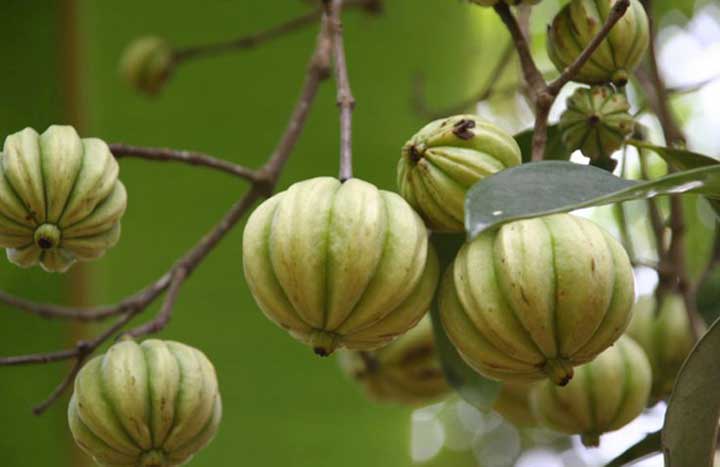 Garcinia cambogia is a fruit that is cultivated in many parts of Africa and Asia. It is highly valued as a source of food and is a favored ingredient in many traditional dishes including certain forms of curry. In areas of the world where Garcinia Cambogia is eaten on a regular basis it is common knowledge that it is an unusually filling food, but the fact that it possesses appetite suppressing qualities has never received the amount of investigation it deserves.
Garcinia cambogia is a fruit that is cultivated in many parts of Africa and Asia. It is highly valued as a source of food and is a favored ingredient in many traditional dishes including certain forms of curry. In areas of the world where Garcinia Cambogia is eaten on a regular basis it is common knowledge that it is an unusually filling food, but the fact that it possesses appetite suppressing qualities has never received the amount of investigation it deserves.
The active ingredient is a citric acid derivative called HCA (hydroxycitric acid) that is present in the rind of the fruit, and as well as functioning as an appetite suppressant it also has the ability to prevent the body from creating fresh fat cells.
Although members of the scientific community have been aware of Garcinia Cambogia for quite some time, its present acclaim as a weight loss enhancer can be traced to an American TV show presented by Dr. Mehmet Oz.
 A cardiothoracic surgeon by profession, Oz has made it his mission to spread the word about little-known or groundbreaking ingredients that can be used to combat the problem of obesity. In 2012 Oz became aware of the study results available and “aired” his recommendation of garcinia cambogia as a weight loss aid.
A cardiothoracic surgeon by profession, Oz has made it his mission to spread the word about little-known or groundbreaking ingredients that can be used to combat the problem of obesity. In 2012 Oz became aware of the study results available and “aired” his recommendation of garcinia cambogia as a weight loss aid.
Oz also recruited a few members of the studio audience and did his own garcinia cambogia trial. The results were good, so this added further credibility to his endorsement and sales of garcinia cambogia products reached an all-time high, although Oz was quick to point out he was recommending the ingredient rather than specific products.
Garcinia Cambogia for Appetite Suppression
 Although garcinia cambogia has a good reputation as an appetite suppressant, a lack of scientific investigation makes it very hard to ascertain exactly why the ingredients has this ability or what the exact working mechanism is. One study, conducted in 2002, by scientists at the Creighton University School of Pharmacy and Allied Health Professions (Omaha, USA), appears to provide some insight into the matter, but further studies will be required to fully ascertain how garcinia cambogia suppresses the appetite.
Although garcinia cambogia has a good reputation as an appetite suppressant, a lack of scientific investigation makes it very hard to ascertain exactly why the ingredients has this ability or what the exact working mechanism is. One study, conducted in 2002, by scientists at the Creighton University School of Pharmacy and Allied Health Professions (Omaha, USA), appears to provide some insight into the matter, but further studies will be required to fully ascertain how garcinia cambogia suppresses the appetite.
The importance of appetite suppression should never be underestimated. People gain weight for one reason only. They have regularly consumed more calories than the body needs. When this happens the extra calories are stored as fat. Appetite suppressants like Garcinia Cambogia can make it easier for people to stick to a calorie controlled diet and attain their dieting goals.
Garcinia Cambogia as a Fat Fighter
 Fortunately a more adequate amount of study has been conducted into Garcinia Cambogia’s other fat-fighting abilities. As stated earlier in this article, the body converts excess calories into fat. The fat cells then remain in situ and are only broken down when the body experiences a lack of calories and has to draw on its reserve supply (body fat). Carbohydrates (in food) generally provide the body with most of its calories—they are a high energy food and, as such, are often a major contributing factor whenever weight gain is experienced. Garcinia cambogia can prevent this from happening.
Fortunately a more adequate amount of study has been conducted into Garcinia Cambogia’s other fat-fighting abilities. As stated earlier in this article, the body converts excess calories into fat. The fat cells then remain in situ and are only broken down when the body experiences a lack of calories and has to draw on its reserve supply (body fat). Carbohydrates (in food) generally provide the body with most of its calories—they are a high energy food and, as such, are often a major contributing factor whenever weight gain is experienced. Garcinia cambogia can prevent this from happening.
Whenever the body needs to convert excess carbohydrate into fat it has to utilize an enzyme called citrate lyase. Garcinia cambogia can interfere with the normal function of citrus lyase. By doing so it prevents it from being able to assist the conversion process, thereby protecting the body from further weight gain.
In one study, rats were separated into three groups.
- Group 1 did not receive any supplementation
- Group 2 was given garcinia cambogia at a ratio of 200mg per kg of bodyweight
- Group 3 received garcinia cambogia at a ratio of 400mg per kg of bodyweight
All three groups were regularly monitored for a period of 5 weeks and subsequent analysis of the gathered data prompted the researchers to conclude: “The results therefore confirm that ethanolic extracts of G. cambogia seeds have both haematologically enhancing and anti-obesity effects.”
Erythropoietic and anti-obesity effects of Garcinia cambogia (bitter kola) in Wistar rats
Several other studies conducted on rodents have met with similar success, but not all tests were animal-based. The weight loss potential of garcinia cambogia has also been tested on human volunteers.
A double-blind, randomized, placebo-controlled, parallel group study was conducted on subjects whose ages ranged from 20 to 65. All of them possessed significant levels of visceral fat. The initial study duration was 12 weeks. One group received Garcinia cambogia (containing 1000 mg of HCA). The other group was given a placebo. At the end of the study period both groups received a placebo for a period of four weeks to assess for any rebound effect. None was observed so, after evaluating the results, the researchers concluded: “It is therefore expected that Garcinia cambogia may be useful for the prevention and reduction of accumulation of visceral fat.”
Recommended Product
 There are dozens of brand in existence that contain Garcina Cambogia – some contain just a trace amount while other contain the exact required daily dosage as specified in the clinical trials.
There are dozens of brand in existence that contain Garcina Cambogia – some contain just a trace amount while other contain the exact required daily dosage as specified in the clinical trials.
We recommend Garcinia Cambogia Extra – containing 1000mg of pure ingredient per serving. In addition it also contains 200mg of pure Raspberry Ketone pre serving.
Leave a Reply